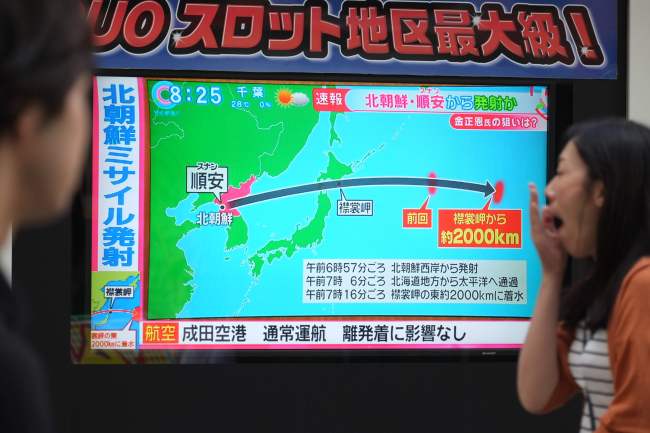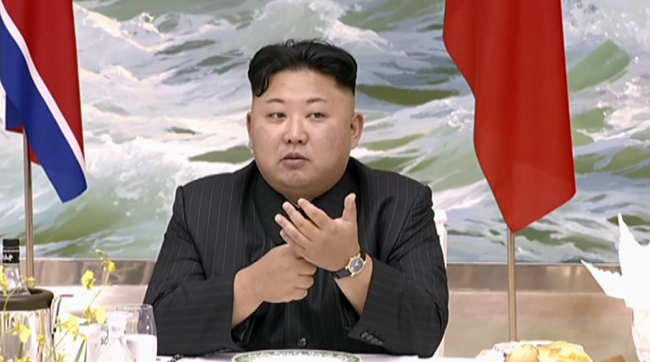North Korea launched an apparent intermediate-range ballistic missile over Japan on Friday, the South Korean and US militaries announced.
The latest in a series of the Kim Jong-un regime's provocations came three days after the UN Security Council adopted a resolution aimed at cutting the North's oil imports by a third.
The "unidentified" missile fired from Pyongyang flew around 3,700 kilometers over Japan into the North Pacific Ocean, according to South Korea's Joint Chiefs of Staff. It reached a maximum altitude of some 770 km, added the JCS.
It's the longest-ever flight distance of a North Korean missile except for some rockets that it claimed were space vehicles.
It's also about 1,000 km longer than that of the previous missile fired from the same area of Sunan in Pyongyang on Aug. 29.
The latest in a series of the Kim Jong-un regime's provocations came three days after the UN Security Council adopted a resolution aimed at cutting the North's oil imports by a third.
The "unidentified" missile fired from Pyongyang flew around 3,700 kilometers over Japan into the North Pacific Ocean, according to South Korea's Joint Chiefs of Staff. It reached a maximum altitude of some 770 km, added the JCS.
It's the longest-ever flight distance of a North Korean missile except for some rockets that it claimed were space vehicles.
It's also about 1,000 km longer than that of the previous missile fired from the same area of Sunan in Pyongyang on Aug. 29.

The US Pacific Command confirmed the North's missile launch at around 6:57 a.m. (Seoul time).
"Initial assessment indicates the launch of an intermediate range ballistic missile," the Hawaii-based command's spokesman Cdr. Dave Benham said in an emailed statement. "The ballistic missile overflew the territory of northern Japan before landing in the Pacific Ocean east of Japan."
But, he added, PACOM "determined this ballistic missile did not pose a threat to Guam," and the North American Aerospace Defense Command concluded it was not a direct threat to North America either.
Nonetheless, it demonstrated the North's capability to strike Guam, where key US military bases are located, with its missile. Guam is roughly 3,400km away from Pyongyang.
It's apparently trying to hone the atmospheric re-entry technology for its various types of missiles.
The South's President Moon Jae-in immediately convened a National Security Council meeting as the country's troops conducted ballistic missile training in the East Sea in response to the North's latest provocation.

The military responded with the firing of two Hyunmoo-II missiles in consideration of the distance between the training site and the Sunan airfield, which is the "origin of provocation," the JCS said.
Fired just six minutes after the North's missile launch, one "accurately hit" a simulated target in the East Sea about 250 km away, a JCS official said. The other, however, fell into the water "in the initial stage," he added. Related authorities are analyzing the reason.
The quick response, based on the early detection of the North's provocation indications, represents the military's combat readiness, he stressed.
Japanese media also reported that the North's missile overflew its northern territory of Hokkaido.
The North's ballistic missile launch Friday marked the 10th since the South's left-leaning president took office in early May.
It came 17 days after the North's Hwasong-12 IRBM flew over Japan, followed by its sixth underground nuclear test days later. It traveled more than 2,700 km amid reports that its full range is estimated at 4,500-5,000 km.
The North earlier threatened to send four Hwagsong-12 missiles toward Guam but held off on the plan, saying it would wait and see Washington's attitude "a little more."
North Korea watchers say it may shoot a Hwasong-14 intercontinental ballistic missile in the near future.
The North plans to celebrate the founding anniversary of the powerful Workers' Party on Oct. 10.
"To build out its nuclear deterrent, Pyongyang will continue to test all sorts of different types of missiles and nuclear weapons," Harry J. Kazianis, director of defense studies from the Washington-based Center for the National Interest, said in an email. "We should expect many more tests in the months and years to come."
He called for stronger sanctions, such as a total ban on the North exporting what amounts to slave labor, which is a source of hard currency revenue, and punitive steps against any Chinese bank helping the regime evade sanctions. (Yonhap)










![[Hello India] Hyundai Motor vows to boost 'clean mobility' in India](http://res.heraldm.com/phpwas/restmb_idxmake.php?idx=644&simg=/content/image/2024/04/25/20240425050672_0.jpg&u=)









